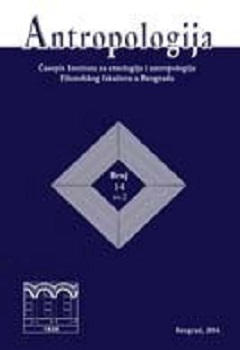Autobiografija i etnografija u Radinovoj antropologiji: Crashing Thunder kao saradnička prozna fikcija i autobiografski narativ o verskom preobraćenju
Autobiography and Ethnography in Radin’s Anthropology: Crashing Thunder as Collaborative Prose Fiction and Autobiographic Narrative about Religious Conversion
Author(s): Gordana GorunovićSubject(s): Epistemology, History of ideas, Philosophy of Science, Cultural Anthropology / Ethnology, Methodology and research technology
Published by: Институт за етнологију и антропологију
Keywords: Paul Radin; American anthropology in the early 20th century; Indian autobiography; Winnebago Indians; religious Peyote cult; religious conversion; strategy of an autobiographer
Summary/Abstract: The book Crashing Thunder: The Autobiography of an American Indian is surely the most popular and likely the most controversial work of Paul Radin. Chronologically, it belongs to Boasian anthropology and is conventionally placed in the trend of culture and personality. In the times of post-structuralism and post-modernism, critical analyses cause a crisis of trust in the mere text and authority of an anthropologist as its author-editor. New acts of reading cause suspicion in anthropological and literary-scientific understanding of the autobiography of Crashing Thunder as an authentic ethnographic document, personal testimony or religious narrative, while revealing and highlighting implicit, symbolic and performative meanings inherent to the native text and its cultural background. In this experiment, the starting point is the experience of the work and text in the reception of an anthropological reader as a narrative about religious conversion and personal testimony. Arguments which support the interpretation of a meaning comprehended in this manner are found in the ethnographic- anthropological relevance of Peyote’s religion as a topic in Radin’s Winnebago opus; a rather likely, but not explicitly formulated idea of the anthropologist to display on a concrete example-case, i.e. life historical testimony of the informant and subjective actor the micro-aspects of the inspected process, cultural and religious changes in Winnebago communities at the turn of the 19th to the 20th century; and features of the autobiographic strategy of the native writer and narrator.
Journal: Antropologija
- Issue Year: 18/2018
- Issue No: 2
- Page Range: 29-66
- Page Count: 38
- Language: Serbian

